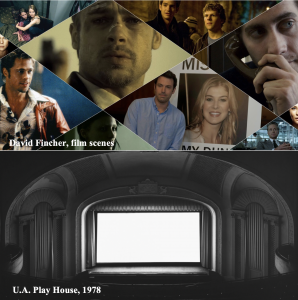
Roland Barthes’ narrative expresses the notion of sticky theatres, hypnotizing one, accompanying his or her often whimsical journey and heightening senses. Barthes emphasizes the place and spatial qualities of the cinema with his perverse analogies: “I am hypnotized by a distance; and this distance is not critical (intellectual)[.]” Cinema is revered as an altar of relaxation and availability; it is a place of that remarkable freedom in the urban dark. The pitch-black of the movie theatre isolates the viewers’ “pre-hypnotic” experiences from any foreign intervention. Barthes’ connoted darkness of cinema conceives a comfortable territory for the film at the very distance between it and the viewers, hypnotizing them to wholly submerge into its realm. This effect takes place through sound, as Barthes describes “[it] reinforces the lifelikeness of the anecdote”.
While Barthes is adamant that the cinema’s darkness and spatial qualities unchain one from reality, acting as an atmospheric adhesive between viewers and the film, it is more convincing that films themselves comprise “hypnotic” elements. These elements are continuously advanced since the Lumiere brothers’ introduction, by directors like David Fincher with their camera techniques. In Fincher’s case, his camerawork encapsulates the viewers into his fictional reality from perfectly aligning camera moves to the characters’ motions. It effectively locks one into the behavior of these characters: Fincher’s reality becomes the viewer’s reality.
However, one must note that the argument arises from the film development over time: cinematic hypnosis was represented to Barthes in a very different context from how it would do so today to people. The capability to create an even more realistic cinematic reality is now defined by the advancement of technology and techniques.
By Lee Hae Jin (UID: 3035444176)
You have raised two very interesting aspects of cinema, the cinema as the place and the cinema as the story. It would be very interesting if you could elaborate how the cinematic hypnosis is different for Barthes and you, does technology and techniques bring us closer to the cinema or further?